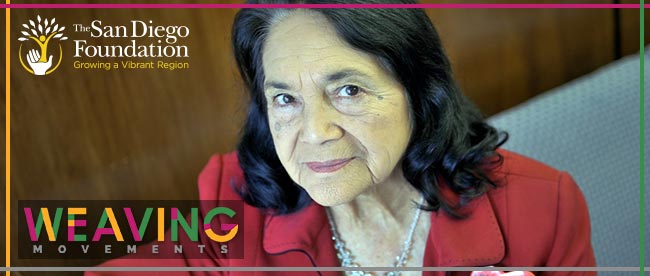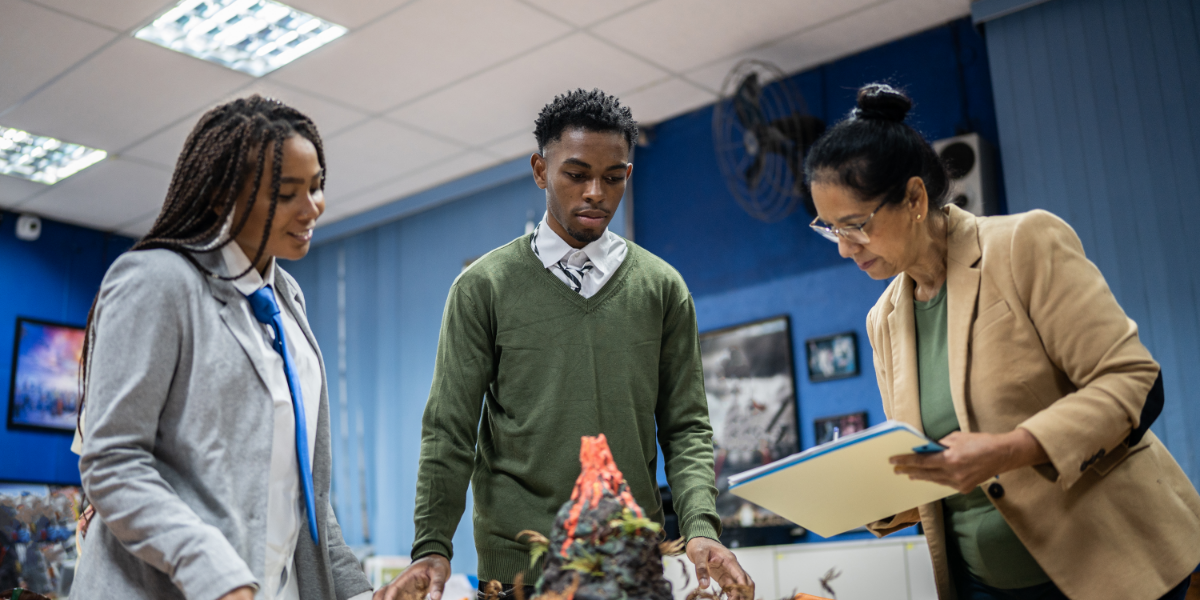In partnership with civil rights icon Dolores Huerta and local leaders, Weaving Movements is a series of free public events that bring the community together to increase dialogue about challenges and opportunities in San Diego.
The campaign builds toward the San Diego premiere of Woman in Motion, a new documentary about Huerta’s life and impact on U.S. civil rights and social change directed by Peter Bratt (La Mission) and produced by Carlos Santana.
Before our kick-off event on August 10, our President & CEO Kathlyn Mead hosted an exclusive interview with Huerta backstage to discuss Huerta’s life, grassroots activism and the film.
Interview with Dolores Huerta
Kathlyn Mead: Dolores, I’m curious about your personal stories. Tell us how you came to believe in movement building and weaving all of these movements together.
Dolores Huerta: Well I guess I can say that I’ve lived it. I was very fortunate to have known Fred Ross Sr., who was organizing the Community Service Organization (CSO) way back in the late 50’s and early 60’s. I was able to work with him. Through that organization, I met Cesar Chavez. We had this common interest about farm workers. We ultimately left CSO to start the National Farm Workers Organization, which became the United Farm Workers. I was very blessed to have learned some of the skills of basic grassroots organizing from Mr. Ross and then be able to put that into practice in both CSO and the United Farm Workers.
KM: How did you know from an early age that being a civil rights activist was your calling?
DH: As a youngster and being a Latina, you see so much injustice. Especially as a teenager, I was always being racially profiled by the police. You just see all this injustice, and you want to do something about it, but you don’t know how.
I had been a Girl Scout from the time I was 8 to the time I was 18 years old. I had belonged to my church organization and youth groups. But, you never really found a way that you could make a change. Once I learned about grassroots organizing, I got so enamored with it because I thought ‘Wow this is the way you do it!’
You could really belong to a group of people and with other people, you could really make some significant changes – through the electoral process, of course, by registering people to vote, and by supporting good people who were running for office. For me, it was like I had found the pot of gold at the end of the rainbow.
KM: But did you know you’d be doing it for 60 years?
DH: Once you see the outcomes and the results, and you see how many people are helped and benefitting, you want to keep on doing it because it’s so simple. If we can just convince other people to get involved, this could make some major changes in our society. It’s very exhilarating. I call myself an addicted organizer, because I know this, and I do it.
[Tweet “I call myself an addicted organizer – @DoloresHuerta #WeavingMovements”]
We just have to convince other people that they have power. This is what they can do by participating to make change, not only in their community, but many times changing in their own lives. Once they participate, they get their sense of power. And then when a group of people get together, it’s collective power. You know that you’re doing it for the good.
That makes it all the better, especially when you see what I call the Forces of Evil – the people that are doing things that are damaging our community in order to continue the discrimination our communities face.
KM: You’ve given up so much to be out in the community working to keep everybody engaged. Do you ever feel like you’ve missed anything in this journey of yours?
DH: When you talk about sacrifices, the ones in my family who have sacrificed are my children, because I love what I’m doing. I love the work. I love to go out there and talk about organizing the people. To me, that’s something I really enjoy.
I think, if anything, my children are the ones who have sacrificed because I’ve had to too many times be absent from them. But, at the same time, they have lived very enriched lives and probably experienced things they wouldn’t have if not for the movements. So, there are some rewards.
My son, Emilio Huerta, is running for congress now. He was a young man who was marching and picketing. So, my kids have lived experiences that could have never been duplicated otherwise. That’s one thing about people who get involved in activism, you live so many experiences that otherwise they wouldn’t be there. This is why peoples’ lives are so enriched.
KM: For somebody who has never really thought about being an organizer, what is the easiest way for that person to become engaged?
DH: We have elections coming up in November. Going door to door and talking to people, convincing them to vote – this is what I call Organizing 101. The first time when I was organizing, I went out and started knocking on doors to see if people were registered to vote. I was a door knocker. I didn’t even have the confidence that I could register people, so I just was out there door knocking. That was my first experience.
Exercise your right to vote. But more important than that is to get other people to exercise their right to vote. We know we only have about half of our population that’s voting. We have to convince people that they have the power to elect people. The people they are electing are the ones making the decisions about how our tax dollars are going to be spent. Is it going to be for more jails, or for more schools? For more house services? It’s very important that people understand that, do their research and find out who to vote for.
And if you don’t know, your labor unions and community organizations, there’s somebody you can ask to guide you. A lot of people, especially in the Latino community, they have this big ballot and all these names and propositions on it, and they say ‘Oh my God’. They don’t know which of these to vote for, so they don’t vote.
The important thing is, if you don’t complete the entire ballot, just mark the things that you know. I say that now we see a lot of hateful rhetoric against Mexicans and the Latino community, but we have a very powerful weapon. And that is our vote. This is the way we can get even with all of the politicians who are insulting us and saying terrible things about our community – by voting them out. And get the good ones. Vote them in.
[Tweet “we have a very powerful weapon. And that is our vote. – @DoloresHuerta #WeavingMovements”]
KM: At The San Diego Foundation, we’ve been talking a lot about economic inclusion, about compensating all workers with a living wage. What would you say to somebody who is trying to get into the workforce to make a wage so they can live independently on their own?
DH: Well, sometimes it’s difficult for people to find work in the first place, right? So, get your resumes in order. Get your people who will support you. Ask all your friends if they can find opportunities for you. Sometimes, we have to promote ourselves. Just go out and be very active about trying to find an opportunity.
As organizations, we have to find ways to create more opportunities, especially for our young people. A lot of corporations, they have to make opportunities for young people – create internships, for example, even if it’s only half-time. We know the corporations are under a lot of pressure to make money, but they’re not finding enough opportunities for our young people.
The majority of Latinos in this country are 28 years old or younger. All of those people out there attacking the Latino community, when you see a Latino going down the street with a baby carriage and a couple of children walking beside them, they should say ‘Hey, there goes my social security and my Medicare.’ Those are the people that are going to contribute to keep our social security system funded and our medical system funded.
It’s important to realize that we all need to work together. With Weaving Movements, we are all interdependent and we all have to work together. If we could just realize that and understand that, we’ll keep our country strong.
KM: With all of the people you have met throughout the years, who are some of the people who have inspired you over time?
DH: Oh, there’s so many. Of course, Gloria Steinem in the women’s movement. Eleanor Smeal of the Feminist Majority. There are all of these great wonderful women I’ve met that are so inspirational. Of course, we have leaders in the African American community as well that we’ve all worked with. One of the great rewards of being an activist is that you get to meet all these wonderful people. And there are many unsung heroes. There are so many out there that are good people that are working hard.
KM: What are one or two thing you hope viewers take away from watching your film?
DH: I hope people become inspired to become active in their community. That’s the important thing. People can take power over their communities and over their lives. Some people don’t realize they can do that. They think ‘It’s OK for other people, but I myself can’t do it.’ Hopefully, that will come out of the film.
Leadership is a choice one makes. When you choose to give up your time and resources to participate in community work, that’s what makes a leader.
[Tweet “Leadership is a choice one makes – @DoloresHuerta #WeavingMovements”]
People would say to Cesar ‘Who is a leader?’ He would say ‘A leader is a person that does the work.’ It’s very simple. It’s a personal choice for people who choose to put in their time and their commitment to do the work. It’s a personal choice.
Sí se puede.




